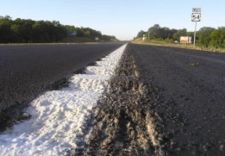Category:626 Rumble Strips: Difference between revisions
Per CM, clarified the location of the rumbles strips and pavement markings for differing shoulder and pavement conditions. It also revised the minimum pavement thickness from 1 3/4" to 1". |
m Per TS, replaced now-archaic special sheet with link to new Std. Plan 626.00. |
||
| (2 intermediate revisions by 2 users not shown) | |||
| Line 2: | Line 2: | ||
{| style="padding:0.3em; margin-left:15px; border:1px solid #a9a9a9; text-align:center; font-size: 95%; background:#f5f5f5" width="160px" align="right" | {| style="padding:0.3em; margin-left:15px; border:1px solid #a9a9a9; text-align:center; font-size: 95%; background:#f5f5f5" width="160px" align="right" | ||
|- | |- | ||
|''' | |'''Form''' | ||
|- | |- | ||
|[[media:131.4 Design Exception Info.doc|Design Exception Information Form]] | |[[media:131.4 Design Exception Info.doc|Design Exception Information Form]] | ||
|- | |- | ||
|[ | |'''Additional Information''' | ||
|- | |||
|[https://www.modot.org/media/16900 Std. Plan 626.00 Rumble Strips] | |||
|} | |} | ||
Rumble strips are a grooved pattern in the pavement that improves safety by alerting drivers as they unintentionally stray from the roadway. The grooves alert drivers by causing the vehicle’s wheels to noisily and suddenly vibrate when it leaves the driving lane. | Rumble strips are a grooved pattern in the pavement that improves safety by alerting drivers as they unintentionally stray from the roadway. The grooves alert drivers by causing the vehicle’s wheels to noisily and suddenly vibrate when it leaves the driving lane. | ||
This article deals with both [[626.1 Edgeline Rumble Strips|edgeline]] and [[626.2 Centerline Rumble Strips|centerline rumble strips]] as well as the [[626.3 Construction Inspection Guidelines for Sec 626|construction inspection guidelines]] that must be considered to achieve a high-quality product. Guidance is also presented for transverse rumble strips | This article deals with both [[626.1 Edgeline Rumble Strips|edgeline]] and [[626.2 Centerline Rumble Strips|centerline rumble strips]] as well as the [[626.3 Construction Inspection Guidelines for Sec 626|construction inspection guidelines]] that must be considered to achieve a high-quality product. Guidance is also presented for transverse rumble strips that are warning devices placed perpendicular to traffic across the driving lane. | ||
For information on Temporary Rumble Strips for use in work zones, refer to [[616.6 Temporary Traffic Control Zone Devices (MUTCD 6F)#616.6.87 Temporary Rumble Strips (MUTCD 6F.87)|EPG 616.6.87 Temporary Rumble Strips (MUTCD 6F.87)]]. | For information on Temporary Rumble Strips for use in work zones, refer to [[616.6 Temporary Traffic Control Zone Devices (MUTCD 6F)#616.6.87 Temporary Rumble Strips (MUTCD 6F.87)|EPG 616.6.87 Temporary Rumble Strips (MUTCD 6F.87)]]. | ||
'''District Responsibility.''' Collaboration with the Highway Safety and Traffic Division and the Design Division is necessary prior to approval of a design exception to omit or modify these system-wide safety improvements (such as rumble strips) on a project. | '''District Responsibility.''' Collaboration with the Central Office Highway Safety and Traffic Division and the Design Division is necessary prior to approval of a design exception to omit or modify these system-wide safety improvements (such as rumble strips) on a project. | ||
It is the district's responsibility to re-install obliterated or deteriorated rumble strips. | It is the district's responsibility to re-install obliterated or deteriorated rumble strips. | ||
Latest revision as of 12:39, 27 July 2021

| Form |
| Design Exception Information Form |
| Additional Information |
| Std. Plan 626.00 Rumble Strips |
Rumble strips are a grooved pattern in the pavement that improves safety by alerting drivers as they unintentionally stray from the roadway. The grooves alert drivers by causing the vehicle’s wheels to noisily and suddenly vibrate when it leaves the driving lane.
This article deals with both edgeline and centerline rumble strips as well as the construction inspection guidelines that must be considered to achieve a high-quality product. Guidance is also presented for transverse rumble strips that are warning devices placed perpendicular to traffic across the driving lane.
For information on Temporary Rumble Strips for use in work zones, refer to EPG 616.6.87 Temporary Rumble Strips (MUTCD 6F.87).
District Responsibility. Collaboration with the Central Office Highway Safety and Traffic Division and the Design Division is necessary prior to approval of a design exception to omit or modify these system-wide safety improvements (such as rumble strips) on a project.
It is the district's responsibility to re-install obliterated or deteriorated rumble strips.
Articles in "626 Rumble Strips"
The following 5 pages are in this category, out of 5 total.